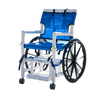Summer Activities for Individuals with Disabilities: Staying Cool and Active

As summer peaks, it's essential for individuals with disabilities to find enjoyable and accessible activities that ensure both safety and comfort. This blog offers timely tips and suggestions for making the most of the season while staying cool and active.
Accessible Outdoor Activities
Engage in accessible outdoor activities such as adaptive kayaking, wheelchair hiking on paved trails, or participating in community garden projects. These activities promote physical fitness and mental well-being (Disabled Sports USA, 2021). Additionally, fishing from accessible piers and joining adaptive cycling groups can provide enjoyable ways to stay active outdoors.
Stay Hydrated and Cool
Hydration is crucial in the summer heat. Drink plenty of water and avoid caffeine or alcohol. Utilize cooling towels and portable fans to stay comfortable during outdoor activities (Mayo Clinic, 2021). Carrying a reusable water bottle with a built-in filter can ensure access to clean water throughout the day.
Virtual Engagements
Participate in virtual events like online fitness classes, social groups, and hobby clubs. These provide a safe way to stay connected and active without the risk of heat exposure (CDC, 2021). Virtual museum tours and online educational courses can also be engaging and stimulating.

Utilize Accessible Facilities
Visit places with accessible amenities such as community pools with wheelchair ramps, parks with adaptive equipment, and indoor recreational centers. These facilities ensure that you can enjoy activities comfortably and safely (National Park Service, 2021). Look for local disability resource centers that can provide information on accessible events and locations.
Recognize Heat-Related Symptoms
Be aware of heat-related symptoms such as dizziness, fatigue, and nausea. Take immediate action by moving to a cooler area, hydrating, and seeking medical assistance if needed (American Red Cross, 2021). Knowing the early signs of heat stress can help prevent more serious conditions like heat stroke.
Additional Tips:
- Plan Ahead: Check weather forecasts and plan activities during cooler parts of the day, such as early morning or late evening.
- Emergency Contacts: Keep a list of emergency contacts and your medical information handy in case of any heat-related emergencies.
Conclusion
By engaging in accessible outdoor activities, staying hydrated, participating in virtual events, utilizing accessible facilities, and recognizing heat-related symptoms, individuals with disabilities can enjoy a safe and active summer. For more personalized advice, consult healthcare professionals and reliable sources like the Mayo Clinic and CDC.
Visit Dansons Medical for a range of high-quality and reliable medical equipment and resources to support your health. Let us be your partners in promoting a healthier and more comfortable lifestyle for individuals with disabilities.
- Dansons Medical Support


 Lifts
Lifts
 Patient Lifts
Patient Lifts
 Stand Assists
Stand Assists
 Standing Aids
Standing Aids
 Slings
Slings
 Parts & Accessories
Parts & Accessories
 Wheelchairs
Wheelchairs
 Ergonomic
Ergonomic
 Portable
Portable
 Reclining
Reclining
 Standing
Standing
 Sporting
Sporting
 Bariatric
Bariatric
 Ramps
Ramps
 Modular
Modular
 Portable
Portable
 Parts & Accessories
Parts & Accessories
 Walking Aids
Walking Aids
 Rollator Walkers
Rollator Walkers
 Canes
Canes
 Crutches
Crutches
 Parts & Accessories
Parts & Accessories
 Scooters
Scooters
 4-Wheel
4-Wheel
 Folding
Folding
 Parts & Accessories
Parts & Accessories
 Nursing
Nursing
 Pregnancy Comfort
Pregnancy Comfort
 Self-Care
Self-Care
 Pump Parts
Pump Parts
 Exercise Equipment
Exercise Equipment
 Treadmills
Treadmills
 Walking Pads
Walking Pads
 Rowing Machines
Rowing Machines
 Strength & Conditioning
Strength & Conditioning
 Saunas
Saunas
 Stethoscopes
Stethoscopes
 Surgical Instruments
Surgical Instruments
 Forceps
Forceps
 Scalpels
Scalpels
 IV Poles
IV Poles
 Oxygen
Oxygen
 Beds
Beds
 Electric Beds
Electric Beds
 Standing Beds
Standing Beds
 Mattresses
Mattresses
 Bed Accessories
Bed Accessories
 Bed Parts
Bed Parts
 Chairs
Chairs
 Medical Recliners
Medical Recliners
 Phlebotomy Chairs
Phlebotomy Chairs
 Stools & Task Chairs
Stools & Task Chairs
 Parts & Accessories
Parts & Accessories
 Tables
Tables
 Overbed Tables
Overbed Tables
 Medical Tables
Medical Tables
 Recovery Couches
Recovery Couches
 Cabinets
Cabinets
 Pool
Pool
 Pool Lifts
Pool Lifts
 Pool Fitness and Therapy
Pool Fitness and Therapy
 Pool Access Chairs
Pool Access Chairs
 Slings
Slings
 Parts & Accessories
Parts & Accessories
 Bath
Bath
 Toileting Aids
Toileting Aids
 Bath Lifts
Bath Lifts
 Shower Seats
Shower Seats
 Parts & Accessories
Parts & Accessories
 Portable Shower
Portable Shower
 Dansons Products
Dansons Products
 Transfer Aids
Transfer Aids
 Cushions
Cushions
 eBooks
eBooks
 Helpful Articles
Helpful Articles
 Reviews
Reviews
 Contact Us
Contact Us
 Create Account
Create Account
 Request a Quote
Request a Quote

Comments 0